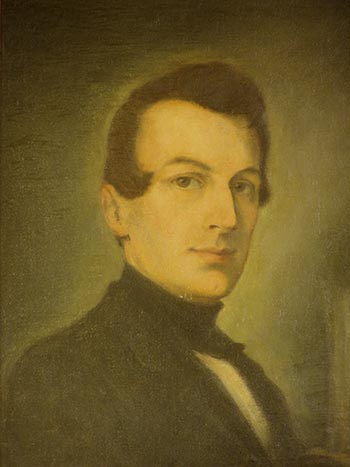Josef Kajetán Tyl
Czech dramatist, actor, novelist and journalist, * 4.2.1808 in Kutná Hora, + 17.7.1856 in Plzeň

Tyl was the most distinctive figure of Czech dramatic art and literature in 1830s and 40s. He stood where the action was considering nationalistic movement.
He spent his childhood in Kutná Hora where his father, retired military musician, was engaged in a tailor’s trade. When he was 14, he left for Prague to study at gymnasium where he was making his living by giving private lessons. He was eagerly visiting Czech and German theatre performances, got acquainted with patriotic society and started to compose poetry.
In 1827, he left for Hradec Králové, where his idol V. K. Klicpera was teaching, to finish gymnasium. Tyl’s dreams came true as Klicpera got fond of Tyl. Tyl lived in his household, copied his works and Klicpera corrected first writing attempts of his student in turn.
As Tyl graduated, he came back to Prague to study philosophy. But soon he was lured to theatre. Discontent with quality of performances in the Theatre of the Estates, he thought of founding his society but he had not enough money. Finally he joined a German wandering company of players, travelled Bohemia with them and adapted plays. There he met his future wife – Magdalena Forchheimová. After its dissolution in 1830 he went over to another company, but one year afterwards he came back to Prague, thin and disillusioned. He was facing military service (14 years at that time) but with help of his friends he got a job of copyist in a military office which sorted out also his financial situation. He devoted all his leisure time to literature and theatre. He played as an amateur actor in the Theatre of the Estates and translated and adapted plays for regular Sunday Czech performances. In 1833, he became editor of magazine “Jindy a nyní” whose title he changed to “Květy české” after one year and later to “Květy” under which title it is issued up to this time. He run it until 1836 and then again from 1840 – 1845. He himself filled all regular columns, he printed his stories, poems and translations and also works of then respected authorities. Unfortunately he was not able to recognise the novelty and genius of Mácha’s “Máj” and condemned it as harmful to the nation.
Soon he became one of the most popular Czech novelists although his works, full of sentimental patriotism, did not rise above the period standard. Especially his novel “The Last of the Czechs” was harshly critiqued by K. H. Borovský. As a journalist, Tyl published magazine “Vlastimil” from 1840 – 1842 and from 1846 – 1849 “Prague Courier” that in the revolutionary years became people’s political newspaper. His attempt to found another political newspaper in 1849 failed because of lack of funds and change of the political atmosphere. But the true domain of Tyl was theatre which he loved and of which he was rightly sure it can play indispensable role in awakening of national awareness and in dispensing culture and education among people of all ranks. In 1834, he and his friends founded Kajetán theatre among whose members also K. H. Mácha, J. J. Kolár and K. Sabina ranked. Tyl proved himself as a player and organiser – he was stage director, dramatic advisor, procured props, painted coulisses and adapted plays. When activity of the theatre was stopped in 1837, he went back to the Theatre of the Estates. At that time he ranked among the most famous and popular nationalists. In 1842, he became the leading figure of a new attempt to establish a stand-alone Czech theatre in Růžová Street but already in 1844 Czech performances had to come back to the Theatre of the Estates. In 1846 Tyl was appointed dramatist advisor for Czech performances here and had not only to choose and assess plays of others but he himself had to supply six translated plays and two plays of his own every year. It pushed his prose into background and popular novelist became a playwright loved by the nation. Tyl’s plays were dealing with current affairs of the period – although often masked as historical plays or fairy tales – and had also educational intentions. In fact, only his early work - farce “Fidlovačka” (1834) dealt exclusively with the national struggle. But his dramas from contemporary life, dramatic fairy tales and historical plays were inspired by contemporary social and political problems as well.
Tyl was actively involved in a public life. In 1848, he was elected centurion of Svornost (part of an armed national guard), worked in Slovanská Lípa, participated in preparations of Slavic Congress and became a member of Reich’s Assemby. Bach’s absolutism meant tragic turn in his life. In 1851, the Czech troupe of the Theatre of the Estates was dissolved and Tyl lost his post of dramatist advisor. He assembled wandering company of dismissed players and until the end of his life he traveled though Czech towns and villages. Years 1851 – 1856 were full of suffering and poverty. He had not enough time to write his works and only hastily adapted plays for needs of the company.
To his last stop in Plzeň he came already seriously ill. His funeral was attended by multitude of residents of Plzeň and surroundings and he was buried with sounds of his song “Kde domov můj”.
Czech Museum of Silver,
allowance organisation
Barborská 28
284 01 Kutná Hora
![]() +420 327 512 159
+420 327 512 159
![]() reservations@cms-kh.cz
reservations@cms-kh.cz
(information about tours)
